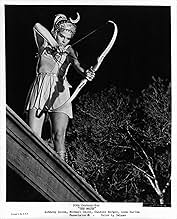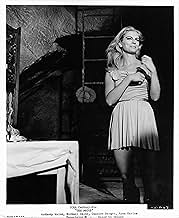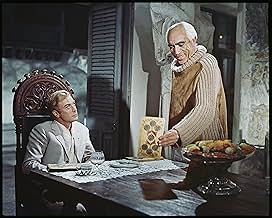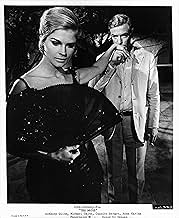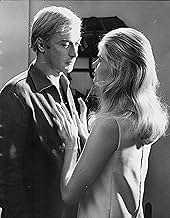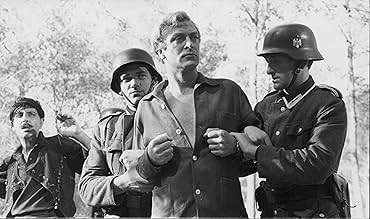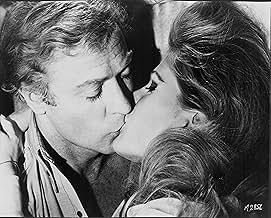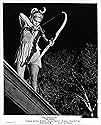VALUTAZIONE IMDb
5,6/10
1996
LA TUA VALUTAZIONE
Aggiungi una trama nella tua linguaA teacher on a Greek island becomes involved in bizarre mind games with the island's magus (magician) and a beautiful young woman.A teacher on a Greek island becomes involved in bizarre mind games with the island's magus (magician) and a beautiful young woman.A teacher on a Greek island becomes involved in bizarre mind games with the island's magus (magician) and a beautiful young woman.
- Nominato ai 1 BAFTA Award
- 1 candidatura in totale
Danièle Noël
- Soula
- (as Danielle Noel)
Andreas Malandrinos
- Goatherd
- (as Andreas Melandrinos)
Recensioni in evidenza
A couple of years ago someone I worked with had a copy of this film and I dubbed a copy for myself. He mentioned the Woody Allen quote about the film which made me laugh, but I guess it also made me a little wary about watching it. I finally pulled it out last night and popped it my VCR. When I wasn't confused there were certain scenes that grabbed my attention. Oddly enough I have a copy of the novel which I haven't read (I say oddly because there are very few books that enter my sphere that go unread, so I'm sure I'll get around to it eventually). As the movie was playing I'd pick up the novel and think, "Boy this sure is a thick book. I bet there are all sorts of thoughts and ideas the characters have in it that aren't finding their way into the film." This isn't necessarily a bad thing, and I don't think movies based on literature have to be a dedicated recreation of their source material, but the film had an overall vague feeling to it. I'm guessing that many people who detest "The Magus" probably don't care for the ending. I know it left me feeling less than satisfied in relation to all the scenes that preceded it. It seemed like what with all that Michael Caine experienced during the course of the movie that a more profound conclusion was in order.
This film came out when I was a senior in college, and I loved it at the time. I thought it was really innovative and thought-provoking. It was also my first introduction to Eliot's famous fragment, which remains a particular favorite. It may be a difference in perceptions that is the root of the film vs book controversy because personally I can't stand Fowler as an author. I think he's extremely pretentious, not to mention boring. But that's just me. Other's like the book and hate the film because of their own perceptions. See the film and judge for yourself. I think it's definitely worth it.
As other commentators I didn't quite know whether to expect the worst movie ever or an undiscovered pearl. Well, it is neither. For lovers of the novel, I feel the film is quite adequate and interesting. Hard to imagine how the film impressions someone who hasn't read the book. In my mind this could have been an excellent film, but for two aspects: the score is awful (especially in the mountain climbing sequence with Anne); the final "trial" is totally botched, filmed as a dream-sequence instead of reality, as it should be, and featuring a ridiculous robot. I wish I could do a re-make.
Being an arty psychological puzzle - and one which might well be not just incomprehensible but also meaningless - I'd always been interested in checking this film out; the fact that it was a critical and box-office failure made it doubly fascinating. Still, what must have seemed like the turkey of the year when new has, with time, acquired a certain charm all its own! On the surface, the film is certainly good-looking (shot by Billy Williams in numerous European locations, mainly a sunny Greek island) and boasts a fine score by Johnny Dankworth (which, in keeping with the film's theme, seems oddly unsuited to what's going on); the star cast responds competently to the mystifying plot (structured like a Chinese box - where past events are constantly re-enacted, identities exchanged and, of course, nothing is what it seems). Still, while Anthony Quinn may be everybody's idea of a Greek larger-than-life character, here he is saddled with an unbecoming Picasso hairstyle and, underneath it all, Michael Caine may well have been mirroring the bewilderment felt by his character since, in his autobiography, he singles out THE MAGUS as his worst film ever (though I personally would beg to differ and choose THE ISLAND [1980] for that unenviable spot)!
Actually, it all reminded me of L'INVENZIONE DI MOREL (1974) - another obscure island-set drama where a man intrudes upon a remote community sharing an exclusive fantasy existence: incidentally, that film was partly shot in my native country and also featured Anna Karina (who in THE MAGUS has the rather thankless role of Caine's jilted girlfriend - though her performance is quite good and his callous treatment of Karina has a strong bearing on the main character's ultimate personal growth) as the mystery woman who captivates the hero; with this in mind, as I lay watching the film under review, I wondered at the possibilities had Karina exchanged her role with that of Candice Bergen (who's too young for her role but great to look at nonetheless).
Then again, the subject matter was far more congenial to a Joseph Losey rather than the journeyman Guy Green...and one can only surmise how different - and more significant - the film would have been in the former's hands! As it stands, there are some undeniably compelling passages but also a lot of shallow modishness (the skin-flick with Bergen and Julian Glover[!] at the climax is plain risible) and lame moralizing (the WWII flashback scenes, featuring a bizarrely but effectively cast Corin Redgrave as the Nazi Commandant, being especially maudlin).
At several points towards the end, it feels like the story is coming to some sort of conclusion but it just goes on and on, peeling off yet another layer to the meandering enigma; to get an inkling of what the film is like, just imagine watching two of the more cerebral episodes of the cult TV series "The Prisoner" (1967-68) back-to-back! In hindsight, the film's epitaph may have been delivered by none other than Woody Allen who once remarked that, if he had to live his life all over again, he would do everything exactly the same...except watch THE MAGUS. As for myself, I wouldn't mind taking another look at it in future: by then I'd be over the initial "shock" and could perhaps appreciate it better...
Actually, it all reminded me of L'INVENZIONE DI MOREL (1974) - another obscure island-set drama where a man intrudes upon a remote community sharing an exclusive fantasy existence: incidentally, that film was partly shot in my native country and also featured Anna Karina (who in THE MAGUS has the rather thankless role of Caine's jilted girlfriend - though her performance is quite good and his callous treatment of Karina has a strong bearing on the main character's ultimate personal growth) as the mystery woman who captivates the hero; with this in mind, as I lay watching the film under review, I wondered at the possibilities had Karina exchanged her role with that of Candice Bergen (who's too young for her role but great to look at nonetheless).
Then again, the subject matter was far more congenial to a Joseph Losey rather than the journeyman Guy Green...and one can only surmise how different - and more significant - the film would have been in the former's hands! As it stands, there are some undeniably compelling passages but also a lot of shallow modishness (the skin-flick with Bergen and Julian Glover[!] at the climax is plain risible) and lame moralizing (the WWII flashback scenes, featuring a bizarrely but effectively cast Corin Redgrave as the Nazi Commandant, being especially maudlin).
At several points towards the end, it feels like the story is coming to some sort of conclusion but it just goes on and on, peeling off yet another layer to the meandering enigma; to get an inkling of what the film is like, just imagine watching two of the more cerebral episodes of the cult TV series "The Prisoner" (1967-68) back-to-back! In hindsight, the film's epitaph may have been delivered by none other than Woody Allen who once remarked that, if he had to live his life all over again, he would do everything exactly the same...except watch THE MAGUS. As for myself, I wouldn't mind taking another look at it in future: by then I'd be over the initial "shock" and could perhaps appreciate it better...
Fowles' first novel became the darling of the emerging counterculture of the 60s. It fit a handy niche of layered narratives, connected in ways that emulated the emergence of "secret" cosmologies. By itself, it created a little stir because of the way it was folded by a certain kabbalistic technique while including reference to that technique.
The history of this makes it essential viewing. Its Fowles' first novel, partially autobiographical, taking over a decade to write. Its grand, risky, sloppy. It is perfect in its way, being as confusing in how it is written as the narrator within is. Its a happy accident that its deficiencies increase the effect.
The screenplay is quite a bit more incompetent and at the same time leaving out most of the ambiguities in the story. So the film is a disaster. Fowles would later straighten up the narrative in the novel and issue what in the film world would be a "director's cut" which tries to keep the ambiguities in the story but reduce them in the narration. Its far less effective than the original.
So why should you see this? Because it is a historical document that changed things significantly. Its based on two sources: one was a then little-known set of Kabbalistic lessons on Tarot ambiguities. The other is a piece of literary theory from the thirties: "Seven Types of Ambiguity." (Don't search it out: it is far less interesting than the title implies.)
Fowles simply conflated his own life (and remorse over handling a romance) into these two notions, deliberately trying to capture the seven types which incidentally inform my study of narrative folding.
In September of 1966 while in Spain for the filming of "How I Won the War," John Lennon, who hardly read anything, read this (twice, once heavily rugged) and it changed his life, the direction of The Beatles and hence enfranchised a new form of narrative. (He called and later visited Fowles while this script was in development. There is no artifact of that in the script.)
Its not Joyce, but it is the child of what he envisioned, dumbed down, but still raising the bar for narrative structure and affecting I assert nearly everything.
Ted's Evaluation -- 3 of 3: Worth watching.
The history of this makes it essential viewing. Its Fowles' first novel, partially autobiographical, taking over a decade to write. Its grand, risky, sloppy. It is perfect in its way, being as confusing in how it is written as the narrator within is. Its a happy accident that its deficiencies increase the effect.
The screenplay is quite a bit more incompetent and at the same time leaving out most of the ambiguities in the story. So the film is a disaster. Fowles would later straighten up the narrative in the novel and issue what in the film world would be a "director's cut" which tries to keep the ambiguities in the story but reduce them in the narration. Its far less effective than the original.
So why should you see this? Because it is a historical document that changed things significantly. Its based on two sources: one was a then little-known set of Kabbalistic lessons on Tarot ambiguities. The other is a piece of literary theory from the thirties: "Seven Types of Ambiguity." (Don't search it out: it is far less interesting than the title implies.)
Fowles simply conflated his own life (and remorse over handling a romance) into these two notions, deliberately trying to capture the seven types which incidentally inform my study of narrative folding.
In September of 1966 while in Spain for the filming of "How I Won the War," John Lennon, who hardly read anything, read this (twice, once heavily rugged) and it changed his life, the direction of The Beatles and hence enfranchised a new form of narrative. (He called and later visited Fowles while this script was in development. There is no artifact of that in the script.)
Its not Joyce, but it is the child of what he envisioned, dumbed down, but still raising the bar for narrative structure and affecting I assert nearly everything.
Ted's Evaluation -- 3 of 3: Worth watching.
Lo sapevi?
- QuizSir Michael Caine lists this, along with Swarm - Lo sciame che uccide (1978) and Ashanti (1979), as one of the worst movies he ever made. This is mainly down to the fact that no one, least of all the audience, knew what it was about.
- BlooperIn the rented room where the English professor will live while continuing the teaching work of his predecessor in the so-called Greek island, there is a rather conspicuous historical XIX century Spanish painting by José Casado del Alisal which represents the first defeat of Napoleon's armies in Spain, in the city of Bailén, where Marechal Philippe Antoine Dupont de l'Estang surrendered to inexperienced Spanish General Castaños on 19 July 1808. Not quite a Hellenic topic, really.
- Citazioni
Maurice Conchis: All men feel the need to risk death at least once in their life. War is a very unscientific answer to that need.
- ConnessioniFeatured in Denúncia Vazia (1979)
I più visti
Accedi per valutare e creare un elenco di titoli salvati per ottenere consigli personalizzati
- How long is The Magus?Powered by Alexa
Dettagli
- Tempo di esecuzione1 ora 57 minuti
- Colore
- Proporzioni
- 2.35 : 1
Contribuisci a questa pagina
Suggerisci una modifica o aggiungi i contenuti mancanti

Divario superiore
By what name was Gioco perverso (1968) officially released in Canada in English?
Rispondi
